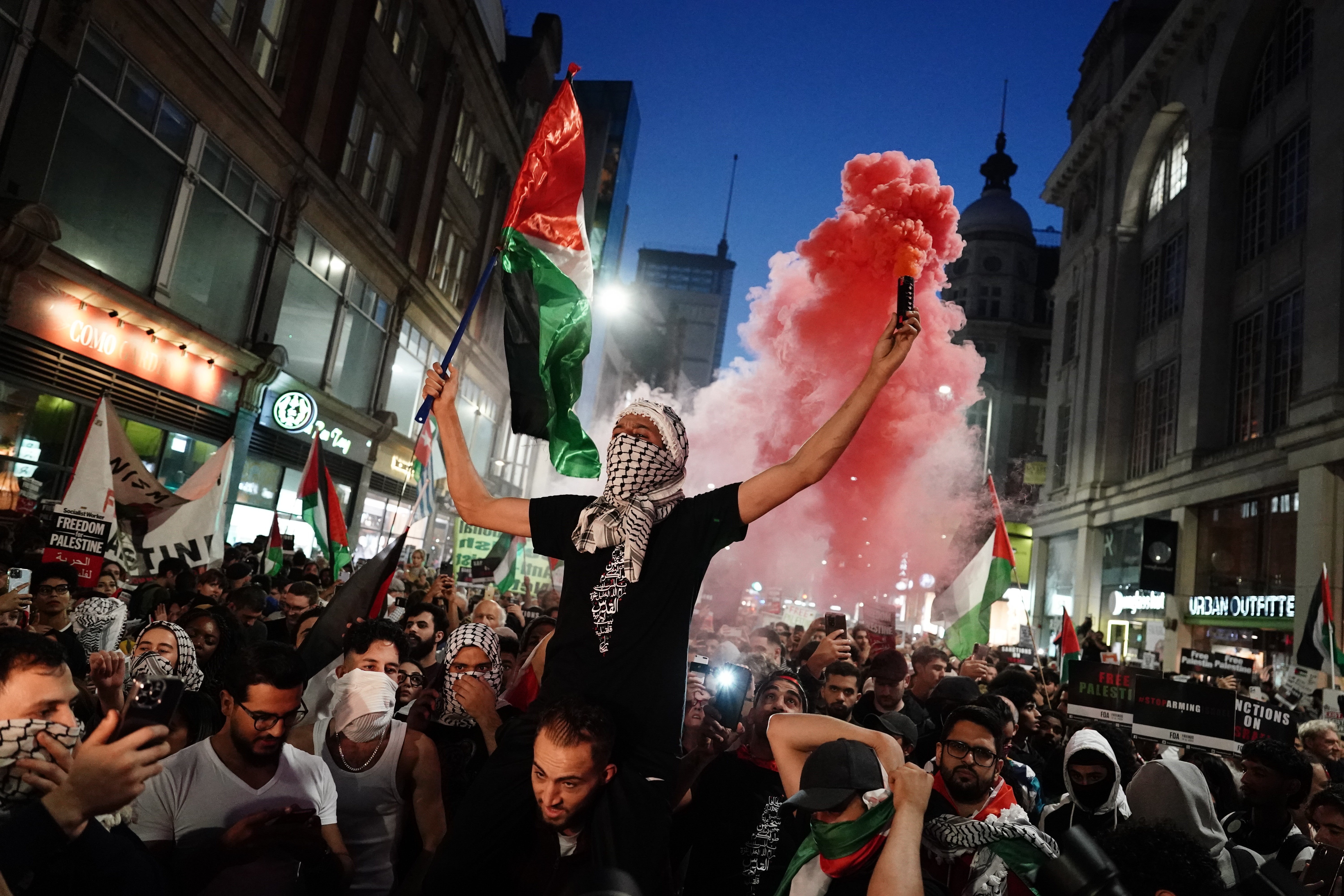Does Britain need a ‘pledge of allegiance’?
The Hamas attack on Israel has sparked a raft of ugly clashes on UK streets. Mary Dejevsky asks if such ‘culture war’ confrontations are evidence that we have failed to properly integrate disaffected third-generation citizens


The images have nothing on the elemental horrors recorded in and around Gaza over the past week, but they still shock – as indeed they should, because they show raw confrontations happening not in the contested territory of the Middle East, but right here in the UK.
Two women are filmed tearing down posters publicising the plight of missing Israelis, believed taken hostage by Hamas. A lone man, with an Israeli flag on his back, wading into a pro-Palestinian rally – outside the Israeli embassy in London, the night following the Hamas attack – to be taunted with cries of “scum”, and “you need to leave”.
There will be many, myself included, who have found themselves unwitting spectators of related if less immediately threatening scenes: cavalcades of honking cars emblazoned with green, red and black Palestinian flags; remnants of marches with similar flags, now drooping in the grip of tired but exuberant revellers; or, on Whitehall, a quieter, but massive, assembly of Israeli supporters, a forest of blue and white.
Nor has it only been in the streets of London where the latest brutal chapter of conflict in the Middle East has reverberated. University towns and industrial cities witnessed similarly emotional displays of allegiance, with academics more associated with ivory towers slugging it out in the trenches of social media.
And, in a way, you might say, why not? This is a cosmopolitan country, home to people of many backgrounds, where free speech prevails (within limits, which we can come to in a while). What is so wrong with that?
But it is not that simple. While most of the demonstrations in London and elsewhere passed off peacefully, there was a vicious and menacing edge. It was hard to interpret the very first honking convoy I glimpsed as anything other than a celebration. At some gatherings, people shouted: “from the river to the sea, Palestine will be free” – that Israelis regard as a call for the end of their state. At one gathering in Australia, protestors were heard chanting “gas the Jews”.
The tone was akin to fans celebrating a sports triumph, but the substance, of course, was appallingly different. It was jubilation – jubilation not just at the mass break-out from prison-like confines of Gaza, but of the cold-blooded killing spree that had followed carried out by Hamas fighters. Some subsequently insisted that it was the cause of a Palestinian state they were supporting, not the atrocities committed by Hamas – but that distinction was hard to observe from the sidelines.
What to make of such rejoicing and chants? What to make of the protestors who tore down the Israeli flag from Sheffield and Rotherham town halls? Or of the advice to Jewish children not to wear their school blazers or any other identifying items in the streets?
This is not the first time, nor will it be the last that a distant conflict will be played out in some way on UK streets. Israel’s last invasion of Gaza nine years ago prompted large-scale protests. Just over a year ago, there were running battles in Leicester between Muslims and Hindus from a South Asian background, related, it was said, to policies pursued by the Indian prime minister Narendra Modi.
The same tensions that have caused a diplomatic rift between Canada and India over Sikh separatism simmer in the UK. Periodic flare-ups between India and Pakistan over Kashmir find their resonance here between the respective diasporas. And in 2009, protests by tens of thousands of Tamils paralysed the traffic near parliament for more than two months in an attempt, that was partly successful, to pressure the UK government to use its influence to facilitate a ceasefire in the Sri Lanka civil war.
And this is another aspect of what can happen when other people’s conflicts start to play out, even in a small way, on UK soil. It is not just the risk of violent confrontations on the streets, the human costs, the costs of policing and the resentments that can spiral if one group thinks its adversaries are being favoured by the UK authorities. It is also the influence that a particularly big or vocal minority population might seek, or be able to exert, over UK policy.
The UK, and London in particular, can be proud of what is referred to in euphemistic shorthand as their diversity, and it is true that, for the most part, everyone rubs along, more successfully than in some countries. But we have not managed to create the “melting pot” the US likes to think it has managed to create. We have, in fact, imported a host of colonial-era conflicts that have survived into the second and even third generation, sometimes changing shape or being intensified in the process.
In this respect, the demonstrations over the past week only help to support the home secretary’s argument that “multiculturalism” has failed. The UK has forged new generations of Britons, but only in part. There are disputes, such as Israel-Palestine, that are being carried on. And the question is what impact this might have not just on public order at home, but on UK policy abroad.
By and large, the UK has been a staunch supporter of the state of Israel, and this support has been on full show this week. The Israeli flag was raised not just over town halls around the country, but over Downing Street. The prime minister went to a north London synagogue. Leaders of all three main parties expressed their fervent support.
But a section of the population – and demography make it a growing section of the population – are Muslim and are unlikely to share that view. The first Muslim woman to enter the Cabinet, Baroness Warsi, resigned back in 2014 on the very issue that is central now, describing Israel’s treatment of Gaza back in 2014, and the UK’s support for it, as “morally indefensible”.
How will the UK’s growing ethnic and religious diversity be reflected, not just in the composition of parliament and government, but in policy? Could it change? And if it doesn’t, will sections of the population become (still more) disaffected?
An interesting argument being used by some of those supporting the Palestinian cause over the past week has highlighted what they see as a contradiction between policy towards Israel-Palestine and towards Ukraine. How can it be that the UK is pledged to support Ukrainians, “whatever it takes” in their quest for national sovereignty and survival as an independent state when it does not support the Palestinians in an equivalent cause? The objection that Ukraine is already an independent state, while Palestine is not, cuts no ice, not least because the UK is – rightly – seen as historically key to the establishment of Israel as a state.
To an extent, by raising foreign flags over government buildings to signal official national allegiance, successive British governments have brought some of this strand of identity politics upon themselves. Perhaps it is time for a re-think – not just of flag diplomacy, but of how better to forge a national identity that keeps such conflicts at arm’s length.
The words that every American schoolchild recites could be a model, in concept if not in precise words, with its pledge of allegiance “to the flag of the United States of America, and to the Republic for which it stands, One Nation, Under God, Indivisible”.
There was a time when the UK would have insisted that such a bald statement of loyalty was as unnecessary as it was undesirable. But is it still?
Join our commenting forum
Join thought-provoking conversations, follow other Independent readers and see their replies
Comments




Bookmark popover
Removed from bookmarks